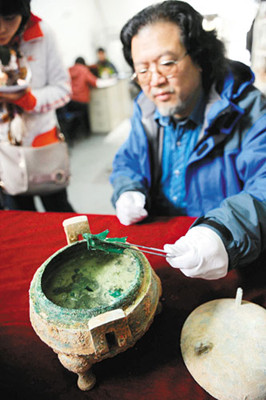
Chinese archaeologists believe they have discovered a 2,400-year-old pot of soup, sealed in a bronze cooking vessel and dug up near the ancient capital of Xian, state press said yesterday.
國家新聞昨日報導,中國考古學家在古都西安發現一鍋兩千四百年前,放在青銅制烹煮器具的湯。
"It's the first discovery of bone soup in Chinese archaeological history," the Global Times quoted Liu Daiyun of the Shaanxi Provincial Institute of Archaeology as saying.
《環球時報》引述陜西省考古研究所的劉呆運表示,“這是中國考古史上首次發現骨湯。”
"The discovery will play an important role in studying the eating habits and culture of the Warring States Period (475-221 BC)."
“這項發現將有助于了解戰國時代(西元前四百七十五到二百二十一年)的飲食習慣與文化。”
The soup and bones were discovered in a small, sealed bronze vessel in a tomb being excavated to make way for the extension of the airport in Xian, home to the country's famed ancient terracotta warriors, the report said.
報導表示,這鍋湯與骨頭發現于一座墓穴被封住的青銅制容器中。該墓穴是因為西安機場擴建工程開挖而被發現。西安就是以發現兵馬俑而著稱。
The liquid and bones in the vessel had turned green due to the oxidation of the bronze, it said. Scientists were expected to conduct further tests to confirm the liquid was indeed soup and to identify the ingredients.
報導說,內部液體與骨頭因為銅銹而變綠色。科學家將進一步研究,確定這個液體的確為湯,并找出制作湯的原料。
Archaeologists also dug up another bronze pot that contained an odorless liquid, believed to be wine, in the tomb, which could belong to either a member of the land- owning class or a military officer, the report said.
考古學家也自墓穴挖出另一具裝過無味液體的青銅罐子,他們認為可能是放在墳墓里的酒。該墳墓曾屬于地主級人物,或者軍官。
Xian, a city that served as China's ancient capital for over 1,100 years, is famed for the terracotta army at the burial site of Qin Shihuang, who presided over the unification of China in 221 BC and declared himself the first emperor.
西安曾經長達一千一百年為中國首都,因秦始皇于該處埋了兵馬俑而著名。秦始皇于西元前二百二十一年統一中國,并自稱皇帝。
詞匯點津:
archaeologist 考古學家
archaeological 考古的
dig up 挖掘
excavate 挖掘
terracotta warriors 兵馬俑
oxidation 氧化
unification 統一











